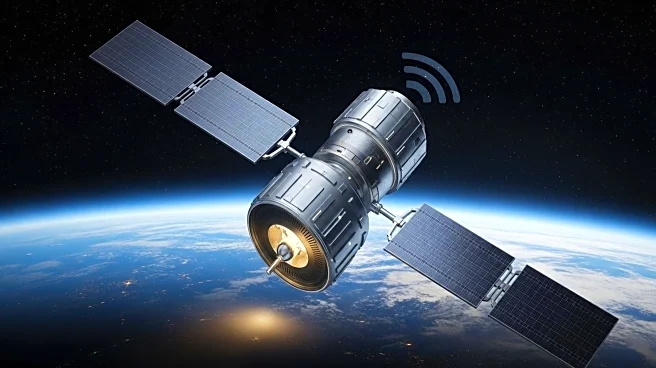What's Happening?
SpaceX has entered into a definitive agreement to purchase AWS-4 and H-block spectrum licenses from EchoStar for $17 billion. This deal includes up to $8.5 billion in cash and up to $8.5 billion in SpaceX stock. The acquisition is part of SpaceX's strategy to enhance its Starlink direct-to-device (D2D) constellation, which aims to provide global satellite broadband services. EchoStar plans to use the proceeds to retire certain debts and fund its operations and growth initiatives. The transaction is expected to resolve inquiries by the FCC into EchoStar's federal 5G obligations and spectrum license rights. EchoStar's Dish TV, Sling TV, and Hughes operations remain unaffected by this agreement.
Why It's Important?
The acquisition of EchoStar's spectrum licenses by SpaceX is significant for the telecommunications industry as it strengthens SpaceX's position in the satellite broadband market. By expanding its Starlink D2D capabilities, SpaceX can offer improved connectivity solutions, especially in remote areas where traditional networks are limited. This move also aligns with SpaceX's goal to provide reliable communication during emergencies and natural disasters. EchoStar benefits by addressing FCC concerns and focusing on its hybrid mobile network operator model, which leverages AT&T's network. The deal reflects ongoing consolidation in the telecom sector, impacting competition and service offerings.
What's Next?
SpaceX plans to develop next-generation Starlink Direct to Cell satellites, enhancing performance and coverage for global customers. EchoStar will continue to operate as a hybrid MNO for Boost Mobile, running traffic on AT&T's network while utilizing EchoStar's cloud-powered core. The industry will likely see further developments in satellite-based communication services, with potential collaborations and innovations in connectivity solutions. Stakeholders, including telecom companies and consumers, will be watching how these advancements affect service quality and accessibility.
Beyond the Headlines
The transaction highlights the growing importance of satellite technology in bridging digital divides and providing resilient communication networks. It raises questions about the future of traditional telecom infrastructure and the role of satellite services in emergency response and global connectivity. The deal may also influence regulatory policies regarding spectrum allocation and usage, as companies seek to optimize their assets for technological advancements.









